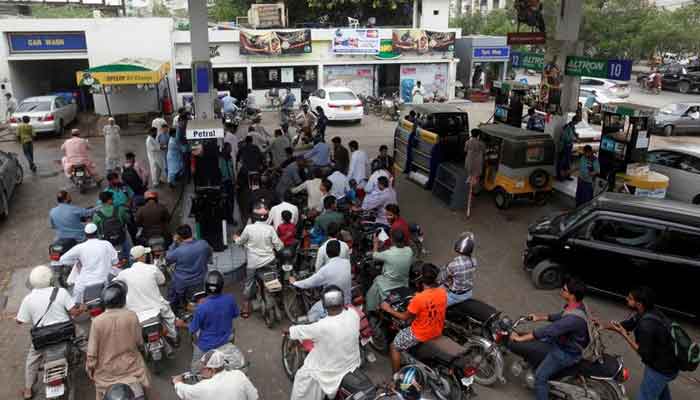[ad_1]

- US dollar exchange rate stands at 271.82 for next fortnight.
- Mogas price would likely go up by 12.8% per litre.
- Price of diesel could rise by 12.5%.
ISLAMABAD: In yet another hike, the prices of petroleum products may increase by over Rs32/litre from February 16 (tomorrow) owing to the US dollar exchange rate, The News reported.
Petroleum, oil and lubricants prices closed at Rs236.40 per dollar which currently stands at 271.82 for the next fortnight. However, the free-on-board Platt prices saw a decline as compared to last fortnight’s pricing.
As per the official and industrial sources, the Mogas price would likely go up by 12.8% per litre or by Rs32.07 to stand at Rs281.87 from Rs249.8 per litre.
Similarly, the price of diesel could rise by 12.5% or by Rs32.84 to stand at Rs295.64 from Rs262.8 per litre previously.
Kerosene oil price was forecast to increase 14.8% or by Rs28.05 to stand at Rs217.88 per litre, while light diesel oil (LDO) could go up 5.3% or by Rs9.90 to stand at Rs196.90 from Rs187 per litre set in the last review.
The above prices have been assumed based on the current government taxes and estimated Pakistan State Oil (PSO) incidentals. The government might adjust the exchange rate at over Rs251 with an increase of Rs15 per litre for both products of Mogas and diesel. The petroleum levy for diesel which stands at Rs40 could increase by Rs10 to Rs50 from February 16.
The government had earmarked the target to get a revenue of Rs850 billion by imposing a petroleum levy on petroleum, oil and lubricants, but the shortfall in this head has been estimated at Rs250 billion, and the authorities have pinned hopes on getting a revenue of Rs600 billion.
The government had carried out a massive increase of Rs35 per litre from February 1, 2023, till February 15.
Currently, the government is charging Rs50 per litre petroleum levy, whereas the general sales tax (GST) has not been imposed yet.
The official said that the exchange rate losses to the refineries and oil marketing companies (OMCs) would be done away with in a staggered manner later on as the government right now does not want to pass the full exchange rate on to the consumers.
The last increase in prices of petroleum products was made in the review on January 29, 2021, by the federal government.
Pakistan is currently facing a short supply of petrol, with its most populous province, Punjab bearing the brunt of the crisis, which was being blamed on petroleum dealers.
It has also been alleged that hoarders were holding onto petrol stocks in anticipation of a price hike scheduled on February 15 (today).
[ad_2]
www.geo.tv
